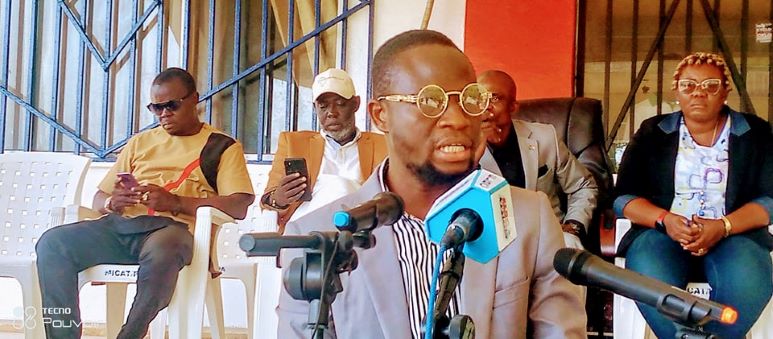PHOTO: Deputy Executive Director, Dobayou speaking at Ministry of Information
Environmental scientists and technicians from the Environmental Protection Agency of Liberia (EPA) have initiated an awareness campaign to educate the public on what President George M. Weah meant when he said that there is an ‘inherent imbalance in the current architecture of climate financing’.
An EPA press release says this comes amid attempts by some opposition politicians to misinterpret the president’s statement at COP 26 in Glasgow, Scotland.
COP stands for conference of the parties and is an annual meeting of the 197 parties who have signed by up to the United Nations Framework Convention on Climate Change (UNFCCC), an agreement aimed at preventing dangerous human interference with the climate system.
President Weah told the 26 Conference of the Parties or COP 26 currently taking place in Glasgow, Scotland, that countries like Liberia, who maintain and protect the largest remaining tracts of forest reserves, receive the lowest benefits for these ecosystem services.
Amidst attempts by some opposition politicians to misinterpret President Weah’s statement, some environmental technicians and scientists from the EPA on Tuesday and Wednesday, 2 and 3 November 2021 made several radio appearances and addressed some intellectual forum to further elucidate and decode the president’s statement.
EPA Deputy Executive Director, Randall M. Dobayou and Daoda Socrates Carlon, Assistant Manager for Environmental Social Impacts Assessment (ESIA) made several radio and public appearances to discuss the president’s statement in specifics.
Serving as guest at the Ministry of Information regular press briefing on Wednesday, following his appearances at OK FM and LBS on Tuesday November 2, 2021, Deputy Executive Director Dobayou said one of the significant steps President Weah took when he was elected was to ensure the ratification of the Paris Agreement in 2018.
“The ratification of the Agreement is a demonstration of Liberia’s highest political commitment to ensure Liberia is among the comity of nations working together in addressing climate change with a focus mainly on mitigation, adaptation, technology transfer, gender, capacity building, and more critical predictable and sustained finance,” Dobayou said.
According to him, another major step the government took against Climate Change is revising and updating our Nationally Determined Contributions (NDCs).
Dobayou said: “NDCs are at the core of the Paris Agreement (PA), under which 191countries, including Liberia, committed to limit global warming to “well below 2 degrees above pre- industrial levels,” and to pursue efforts to limit the temperature increase to 1.5°C.
The NDCs are the delivery mechanism to reach the PA goals, he added.
He disclosed that Liberia took some ambitious steps by including three different sectors that were not in the Initial Nationally Determined Contributions (INDC).
“These three sectors include Fisheries, Coastal zone, and Industry. We have a total of nine thematic sectors ranging from Agriculture, Coastal zone, Energy, Fishers, Forestry, Health, Transport/Infrastructure, and waste. For Example, under the forest sector, Liberia commits some mitigation targets to reduce GHG emissions,” the EPA Deputy Executive Director noted.
He explained that Liberia further commits to reducing its economy-wide greenhouse gas emissions by 64% below the projected business-as-usual (BAU) level by 2030, through a combination of unconditional GHG reductions of 10% below BAU, resulting in an absolute emissions level of 12,430Gg (gigagram) CO2e in 2030, with an additional 54% reduction conditional upon international support, which would result in an absolute emissions level of 4,537Gg CO2e in 2030.
Despite a low carbon emitter country, Liberia raised her.
What Are The Challenges?
Speaking further, Dobayou said that for the UNFCCC to genuinely achieve her objective in terms of stabilizing GHG concentrations in the atmosphere to prevent risks in the climate system, there are few things, to be honest about.
“We need to be sincere and honest at the negotiation table when developed, and developing countries meet. Developing and least developed countries that are vulnerable to the impacts of Climate Change are honoring their commitments and increasing their adaptation and mitigation targets, while developed countries are not delivering on theirs,” he said.
He further noted that many bureaucracies in accessing climate finance for smaller countries should be reduced.
“These technicalities should be reduced to allow vulnerable countries access money to build their resilience and adaptive capacity,” he noted.
He also disclosed that years back in 2009, developed countries pledged to deliver USD 100 Billion to developing countries every year, but this commitment has not been achieved and said “we are hoping Cop26 can resolve this adequately.
“Lastly, we should equitably be given a chance to negotiate the Carbon Market under the market and non-market mechanism of article 6 of the Paris Agreement,” he noted.
The price of carbon sales, Dobayou said should be determined by countries with the carbon sink, not the bigger polluters that are not carbon sink.
“We need to increase global mitigation ambition; the intent is to prevent the accounting loopholes and generate increased support to the Adaptation Fund. We should consider Climate Finance by mobilizing and increasing external support for adaptation and mitigation initiatives. Loss and Damage should be prioritized; innovative approaches and greater financial and technical support should be highlighted for vulnerable countries,” the climate scientist said.
He further noted “we are victims of climate-induced impacts who have fewer choices to make; we are at the receiving end of the pollution initiated by industrialized countries. These countries should pay their fair share and stop the bureaucracy. This is what I expect coming out of COP26 when the Scientists meet the policymakers.”

